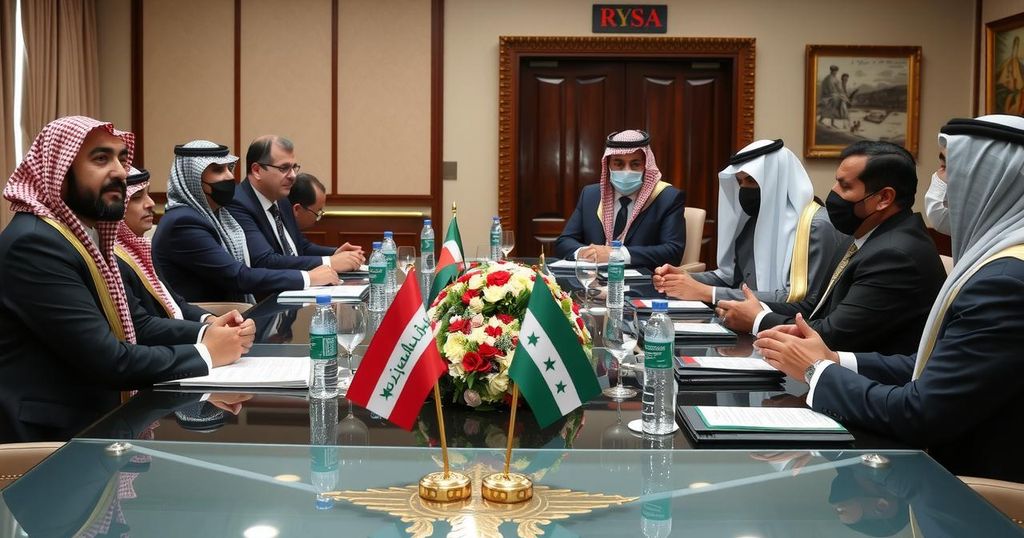Secretary of State Antony J. Blinken met with Arab foreign ministers in Jordan to discuss a political transition in Syria following the fall of Bashar al-Assad. The talks aimed at fostering a Syria-led political process amidst regional implications, including Turkey’s increasing influence and Israeli security concerns. The absence of Syrian representation highlighted the tenuous nature of the transition.
On Saturday, Secretary of State Antony J. Blinken convened with Arab foreign ministers in Jordan to deliberate on strategies to facilitate a political transition in Syria following the recent ousting of President Bashar al-Assad. The meeting comes at a pivotal moment, marked by the rise of a new caretaker prime minister, Mohammed al-Bashir, amidst a backdrop of celebration and apprehension in a war-torn nation grappling with decades of oppression.
The discussions aimed to foster a Syria-led political dialogue focused on establishing a transitional government. Among the attendees were foreign ministers from Jordan, Saudi Arabia, Iraq, Lebanon, and Egypt, along with the secretary-general of the Arab League, Ahmed Aboul Gheit, while representatives from Turkey, the United Nations, and the European Union were also present. The absence of a Syrian representative was notable during these discussions.
Turkey’s role has become increasingly significant following its support for the Hayat Tahrir al-Sham rebel group, which played a crucial role in the recent transition. Moreover, Turkey plans to reopen its embassy in Damascus, closed for nearly 13 years, and has conducted military operations in northern Syria targeting Kurdish militants, whom it views as a threat. The Turkish Foreign Minister, Hakan Fidan, emphasized the necessity of removing the People’s Protection Units (YPG) from northern Syria, marking an aggressive stance towards Kurdish forces, which have historically collaborated with the United States against ISIS.
Secretary Blinken’s visit to Jordan is part of a broader Middle Eastern tour, including stops in Ankara and Baghdad, aimed at assessing the implications of President al-Assad’s removal. There is increasing concern among U.S. officials regarding the potential instability in Syria and its ramifications for neighboring countries.
The conflict in Syria has historically contributed to the emergence of ISIS and ongoing regional instability. In response to the chaotic situation, Israel has capitalized on the collapse of the Assad regime by targeting sites in Syria it perceives as security threats. Following recent Israeli airstrikes, Syria has lodged a formal complaint with the United Nations Security Council, urging action against Israeli aggressions.
Discussions surrounding Syria involve significant international stakes, with desires for a democratic transition contending against a backdrop of geopolitics, including Iranian influence, the roles of neighboring states, and ongoing security threats posed by extremist groups across the region.
The U.S. Central Command also engaged in discussions with Israeli military officials this week, focusing on the evolving circumstances in Syria and the broader geopolitical landscape.
The political situation in Syria has been fraught with turmoil since the onset of the civil war in 2011. The recent overthrow of Bashar al-Assad’s regime signified a turning point, galvanizing regional players and prompting heightened interest from major global powers such as the United States and Turkey. Efforts to establish a stable political transition are crucial as the country faces multifaceted challenges from various armed groups, a fractured society, and potential external threats, especially from entities like Islamic State and ongoing regional hostilities.
In summary, Secretary of State Antony J. Blinken’s discussions with Arab foreign ministers in Jordan mark a significant moment in shaping the future of Syria following the recent upheaval against Bashar al-Assad’s rule. The complex geopolitical landscape necessitates a cohesive strategy to ensure a peaceful transition and address the vulnerabilities faced by the region. A concerted effort from regional and global actors is essential to navigate this crucial juncture, ensuring stability and progress in Syria.
Original Source: www.nytimes.com






